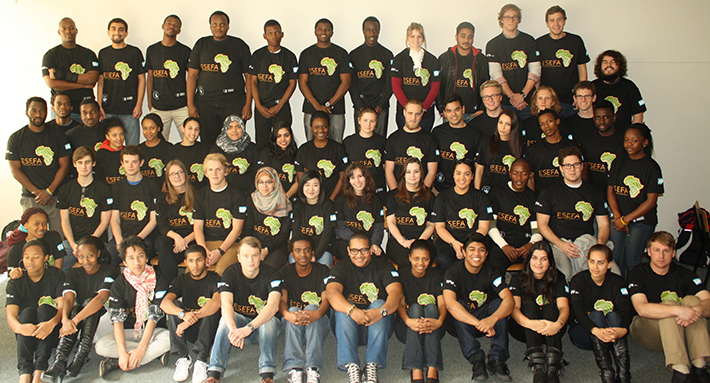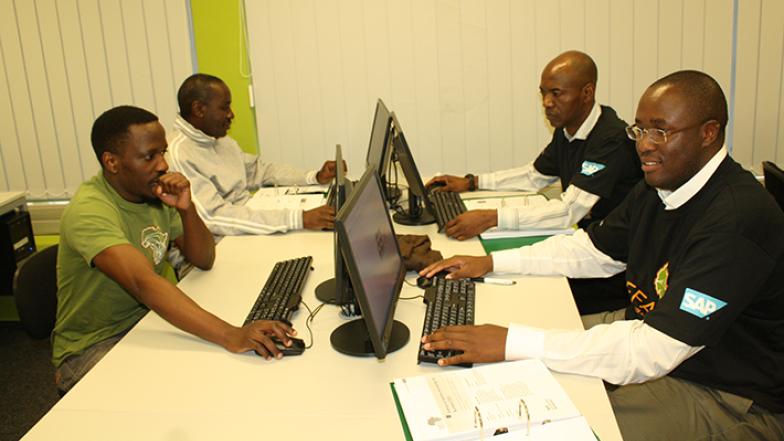
UCT's Department of Information Systems has adapted some of the existing SAP UA curriculum (which is based on a fictitious company known as GBI or Global Bike Inc.) for the ESEFA curriculum based on a real-life company Zambikes (situated in Lusaka, Zambia) to give it an African flavour. This gives students a context which is easy to relate to when learning about Enterprise Systems (ES) theory.
Taking account of the unique African context the modular curriculum has been designed to match regional market requirements and learning needs in Enterprise Systems education. The curriculum consists of adjustable content allowing for the implementation of a highly integrative course design – either as a short course or study-related scenarios.

How courses are offered at ESEFA partner universities
The Department of Information Systems at UCT has developed an Enterprise Systems curriculum for each of the identified discipline streams:
• Logistics Management
• Business Computing / IS (Business Analysis)
• Industrial Engineering
• IT / Computer Science
• Accounting
The aim is for these courses to be integrated into existing 3rd or 4th year and post-graduate courses in the respective disciplines at ESEFA partner universities.
ES Fundamentals for Business course overview
A 5-day short course ‘ES Fundamentals for Business’ consisting of core modules has been developed for non-degree purposes.
Requirements for course enrolment
Students may attend the course and write the examination at any ESEFA partner university if they are registered students at a recognized tertiary institution and up to three months after they have graduated from a tertiary institution.
Content delivery
The course structure consists of approximately 13 hours of classroom lecture, discussion and exercise sessions and 10 hours of computer lab sessions where students do online workshops/tutorials on the actual SAP ERP system.
The duration of the course is envisaged to be from 9h00 to 17h00 for 4 days, the last day is intended to be used for revision with the 2 hour MCQ (Multiple Choice Question) examination being written in the afternoon. The examination is set and evaluated by the ESEFA Centre at UCT.
Qualification
Students that successfully complete the qualifying examination will receive a SAP University Alliances (SAP UA) ‘ES Fundamentals with SAP’ Proficiency Certificate.
Course description
This course provides a general overview of Enterprise Systems (ES) using SAP ERP software. Case studies cement the theoretical foundation of the system and business processes by putting theory into practice using integrated business processes. The “Guided learning” method explains processes and procedures in detail and makes sure knowledge is imparted quickly. Students learn about a number of theoretical and practical issues concerning business processes and their mapping into an enterprise system. After completing this course, students will be able to identify and match real-life business processes into ES business processes. The course consists of a core curriculum comprising SAP Navigation together with the Procure-to-Pay, Sales-to-Cash and Inventory Management business processes. The course can be concluded with an ES Fundamentals qualification exam.
Learning objectives
Students will gain theoretical and practical knowledge of business processes as supported by enterprise systems software. The first module on Business Processes introduces a case study of a bicycle manufacturer and retailer. The business processes of Procure-to-Pay; Sales-to-Cash and Inventory Management are explained for the case study.
The module on ES enables students to understand how ES software supports business processes and how enterprise systems are implemented to match organizational business processes. Students will understand organizational data and master data and how they are implemented in SAP ERP systems.
During the Procurement, Sales and Inventory Management modules students will learn how to analyze a task and construct the steps for the business processes in an enterprise system and how real-time integration with inventory management is achieved. Students will gain practical experience in navigating the SAP ERP and Crystal user interface.